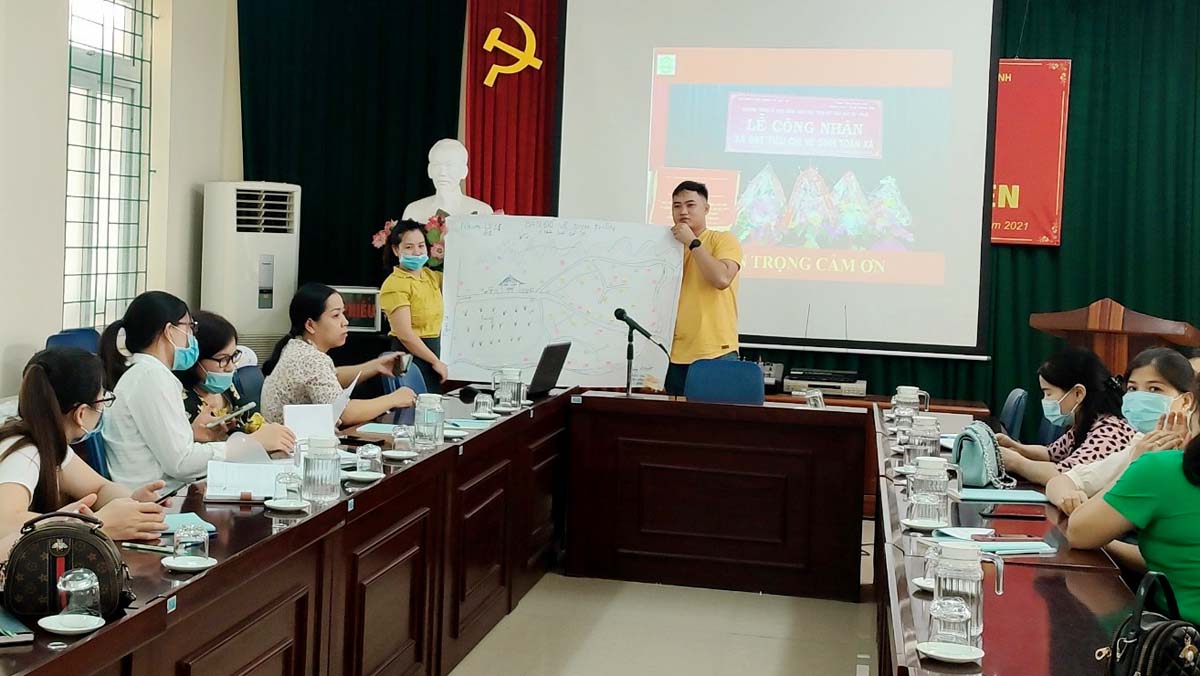
(HBO) – The programme on results-based scaling up rural sanitation and water supply, funded through a World Bank loan, has been carried out in Hoa Binh province since 2018. Among the relevant agencies and units assigned by the provincial People’s Committee, the health sector is in charge of coordinating the implementation of the tasks to achieve three main targets, namely 60 communes meeting "commune-wide sanitation” standards, 30 others "sustainable commune-wide sanitation”, and 85 water supply facilities and toilets of communal health stations upgraded or built.

Key provincial and district personnel draw communication maps to improve awareness and practices of sanitation in rural areas.
Deputy Director of the provincial Health Department Hoang Thi Thuy said the health sector has been pushing ahead with implementing the programme to expand the coverage of hygienic toilets, thus improving environmental hygiene in rural areas, reducing hygiene-related diseases, and help achieve the targets of the national strategy on rural sanitation and water supply.
Due to impacts of the COVID-19 pandemic, the programme was extended to the end of 2022.
The implementation also faced certain difficulties, including a lack of manpower, especially during the COVID-19 pandemic, she noted, adding that it was also not easy to select communes to carry out the programme, particularly when rural residents’ awareness and economic conditions were still limited.
In the face of such difficulties, the Health Department has made annual implementation plans which identified roadmaps and targets. In particular, the sector has provided training for key provincial and district personnel, who later would implement the programme in the targeted communes and hamlets via a wide range of activities, including disseminating information via megaphones and community meetings, drawing propaganda posters, and facilitating the market of hygiene equipment.
In the initial phase, financial aid of 1 million VND (42 USD) was given to each poor household, and 500,000 VND to each near-poor to help build hygienic toilets. Since 2020, financial assistance was no longer provided but focus has been put on communications to raise public awareness and change hygiene practices by each people, each family, and the entire community.
Thanks to strong efforts, the rate of rural households with hygienic toilets in Hoa Binh province has gradually increased, to 71.75% in 2018, 79.15% in 2019, 82.56% in 2020, and 83.74% in 2021. The figure is expected to reach 85% in 2022.
The Health Department targets that in 2022 - the last year of the programme, all households, along with teachers and students of schools in the eight communes that have achieved "sustainable commune-wide sanitation”, would access relevant information and build or use hygienic toilets. Besides, eight communal health stations of four districts would have clean water supply facilities, hygienic toilets, and usable hand washing places.
So far, the health sector has obtained its three main targets, helping improve rural environmental hygiene and creating an important stepping stone for districts in Hoa Binh to press on with the work and build civilised new-style rural areas./.
More than just an information technology teacher, Bui Van Nien is an inspiring figure who has nurtured the scientific curiosity and creative spirit of students in Vietnam’s ethnic minority communities.
Da Bac is the most disadvantaged mountainous district in Hoa Binh province, with ethnic minorities accounting for about 90% of its population. Over the past years, the district has mobilised resources to implement ethnic policies to improve the quality of life of local people.
In recent years, Hoa Binh province has consistently prioritised the protection, care, and education of children, particularly those from ethnic minorities and disadvantaged backgrounds, by creating a safe, healthy, and nurturing environment for their all-round development.
The Steering Committee for Tobacco Harm Prevention and Control of Hoa Binh province, in coordination with the Tobacco Harm Prevention and Control Fund, held a ceremony on May 28 in response to the World No Tobacco Day (May 31) and the National No Tobacco Week (from May 25 to 31). The event was chaired by Nguyen Van Toan, Standing Vice Chairman of the provincial People’s Committee and head of the Steering Committee.
Since 2021, the Center for Industrial Promotion and Industrial Development Consulting (CIIDC) under the Department of Industry and Trade has been implementing a school lighting model as part of the plan for using energy efficiently and economically in Hoa Binh Province in the pẻiod of 2021 - 2025. This model not only aims to improve the learning conditions and enhance the education quality, but it also promotes the message of energy saving, energy security, environmental protection and contributes to the goals of socio-economic development.
In the 2024 - 2025 school year, the entire Hoa Binh provincial education sector includes 520 educational institutions and schools. Among them are 13 ethnic boarding schools with 153 classes and 4,487 students. Four of these schools have met national standards, reaching 30.7 percent.



